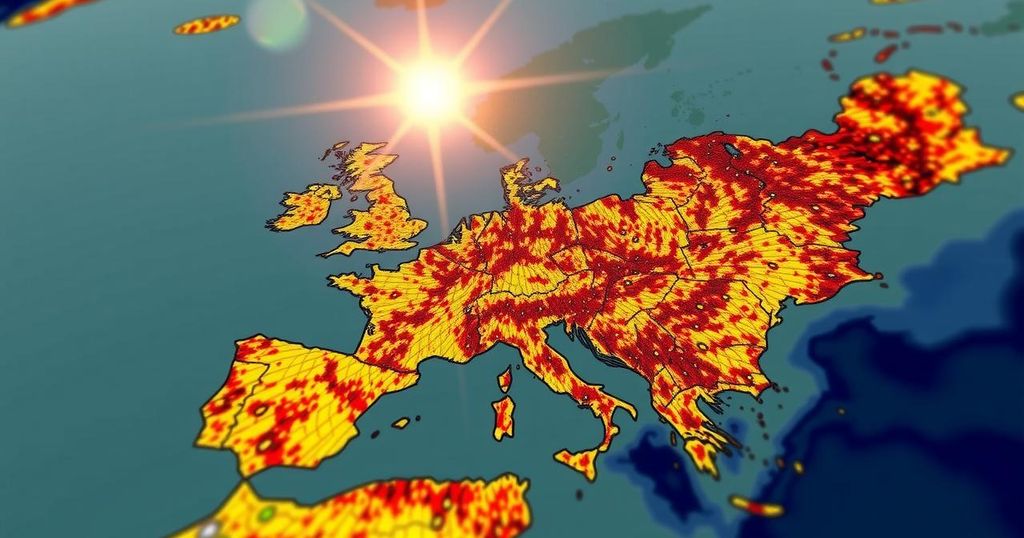Climate change
ALTA, ARCTIC, ARCTIC CIRCLE, ARCTIC NORWAY, ARI, ARILD SUNDFJORD, ASIA, BARE, BARENTS, BARENTS OBSERVER, BARENTS SEA, CLIMATE, CLIMATE CHANGE, EUROPE, EUROPE/ASIA, EUROPEAN, EXTREME WEATHER, FINNISH LAPLAND, FRANCE, GLOBAL WARMING, HAMMERFEST, INDIA, KIRKENES, MURMANSK, NORTH, NORWAY, NORWEGIAN METEOROLOGICAL INSTITUTE, NORWEGIAN POLAR INSTITUTE, PARIS, RUSSIA, RUSSIAN ARCTIC, SINGAPORE, TROMSØ, WEATHER, YE, YEE
Marcus Li
0 Comments
Record Heat in Arctic Norway Signals Alarming Climate Change Effects
Record high temperatures in Kirkenes, Norway, reaching 11.6°C on November 8, 2024, have disappointed tourists expecting winter conditions, leading to canceled snow-related activities. Experts link these temperature spikes to climate change, warning of severe ecological consequences and challenges for local economies relying on winter tourism.
On November 8, 2024, Kirkenes, located in Arctic Norway, experienced an unprecedented temperature of 11.6°C, surpassing its prior November record by 2.8 degrees. This unusual warmth has prompted discomfort among tourists eager for winter activities, such as snowmobile tours, which have been canceled due to the lack of snow. Visitors from Singapore, including Sap and Yee, expressed their disappointment but acknowledged climate change as a significant factor influencing weather patterns. This extreme heat is not isolated to Kirkenes; other regions in the Arctic Circle have also recorded high temperatures, including Tromsø (11.4°C), Alta (14.7°C), and Hammerfest (11.8°C). Furthermore, the city of Murmansk in Russia reached a notable 10 degrees Celsius, the warmest since 1975. Experts attribute these weather changes directly to climate change, emphasizing that while some locales may initially benefit from warmer conditions, the overall impact on global ecosystems is dire. Physical oceanographer Arild Sundfjord from the Norwegian Polar Institute warns that continuing to experience such heat will lead to rising sea levels, intensified storms, and species extinction in the Arctic, particularly polar bears. He emphasizes the seriousness of this phenomenon, noting that 2024 might be the first year worldwide to exceed the 1.5-degree threshold established in the Paris Agreement—an indicator of the changing climate. Overall, these developments signal a troubling trend for northern regions. Tourism in the Arctic is being adversely affected; potential visitors are reconsidering winter travels due to persistent warm temperatures. As climate conditions continue to fluctuate, it is essential to assess the potential consequences on both the environment and local economies reliant on seasonal tourism.
The article addresses the alarming rise in temperatures occurring in the Arctic, particularly in regions such as Kirkenes, Norway. Observations of record-breaking warmth in November of 2024 reflect a broader trend of climate change, impacting weather patterns and ecosystems in the region. As tourists adjust their plans due to unexpected conditions, the article highlights expert opinions on the dire consequences of climate change, including ecological disruptions and economic challenges for communities dependent on winter tourism.
In conclusion, the record November heat in the Arctic, exemplified by Kirkenes’ unusually high temperatures, underscores the urgent issue of climate change. The unexpected warmth is causing significant disruptions in local tourism and poses serious threats to the ecosystem. Experts agree that these patterns are indicative of broader global climate shifts, necessitating increased awareness and action to mitigate the impacts on vulnerable Arctic habitats and communities.
Original Source: www.thebarentsobserver.com




Post Comment